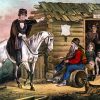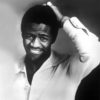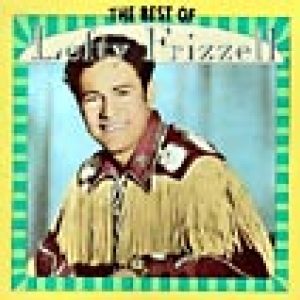calsfoundation@cals.org
"Lefty" Frizzell (1928–1975)
aka: William Orville Frizzell
William Orville “Lefty” Frizzell was virtually the prototype of what became known as honky-tonk singers—plainspoken vocalists whose regional roots were immaterial because they sounded as friendly as a storytelling neighbor. Willie Nelson remarked that “without Lefty Frizzell, a lot of us singers wouldn’t have a style.”
Lefty Frizzell was born on March 31, 1928, in Corsicana, Texas, but he soon moved from one small town to another in Arkansas, Louisiana, and Texas as the son of an oilfield worker. Country singer David Frizzell is his younger brother. He debuted as a singer on radio station KELD in El Dorado (Union County) when he was twelve, and he acquired his nickname in a schoolyard brawl. He is widely regarded as one of the most influential singers in country music history.
At eighteen and already married, Frizzell began appearing on radio station KGFL in Roswell, New Mexico. These radio appearances, as well as his concerts, were immensely popular and landed him recording deals with the Columbia label. His first hit single was “If You’ve Got the Money, Honey, I’ve Got the Time” in 1950. His next was the flip side, “I Love You a Thousand Ways,” a song he composed while serving a six-month jail term for statutory rape. He was invited to appear at the Grand Ole Opry in 1950. His last No. 1 hit was “Saginaw, Michigan” in 1964.
Frizzell was not praised in his lifetime as a definitive country singer, but he influenced multitudes that came after him. He virtually crooned his lyrics in a conversational, vowel-rolling style that made hard-core honky-tonk music palatable to many who otherwise shunned it. Among his most famous recordings was his original 1959 version of “The Long Black Veil,” an “instant” folk song written by Danny Dill and Marijohn Wilkin, which became an international standard in Frizzell’s stark, no-frills reading of it.
Frizzell made recordings until his July 19, 1975, death, which was caused by a stroke (possibly a consequence of his almost lifelong addiction to alcohol). He is buried in Goodlettsville, Tennessee. In 1982, he was inducted into the County Music Hall of Fame. In 2005, he was inducted into the Arkansas Entertainers Hall of Fame. In 2018, a twenty-CD box set of Frizzell’s recordings, complete with a book, was released under the title An Article from Life.
For additional information:
Hemphill, Paul. The Nashville Sound: Bright Lights and Country Music. New York: Simon and Schuster, 1970.
Horstman,Dorothy. Sing Your Heart Out, Country Boy. Nashville, TN: Country Music Foundation Press, 1996.
“Lefty Frizzell.” Country Music Hall of Fame and Museum. https://www.countrymusichalloffame.org/hall-of-fame/lefty-frizzell (accessed August 2, 2023).
Martin, Philip. “Lefty Who?” Arkansas Democrat-Gazette, December 9, 2018, pp. 1E, 6E.
Widner, Ellis. “Frizzell Dominated County Music in the ’50s.” Arkansas Democrat-Gazette, December 9, 2018, p. 6E.
Jim Kelton
University of Arkansas, Fayetteville
 Arts, Culture, and Entertainment
Arts, Culture, and Entertainment Music and Musicians
Music and Musicians World War II through the Faubus Era, 1941 through 1967
World War II through the Faubus Era, 1941 through 1967 "If You've Got the Money Honey (I've Got the Time)," Performed by Lefty Frizzell
"If You've Got the Money Honey (I've Got the Time)," Performed by Lefty Frizzell 




Lefty was a wonderful, unusual singer. His younger brother croons like him. Too bad alcohol takes such talent from us. He is resting in peace.